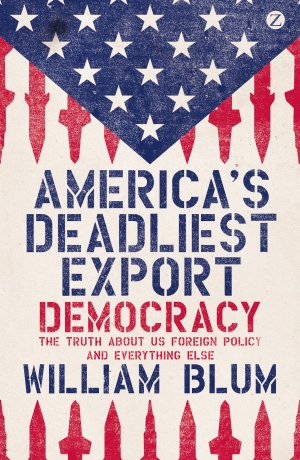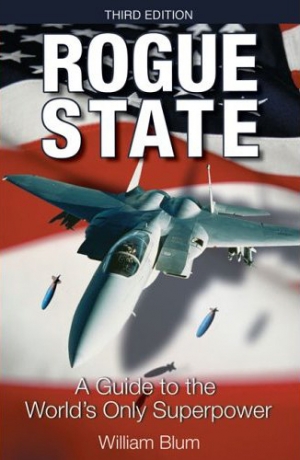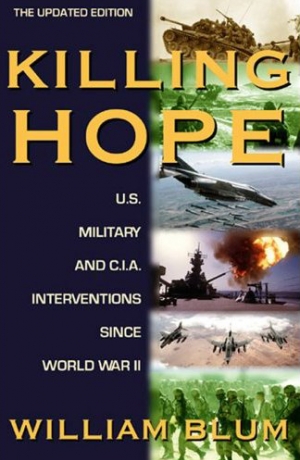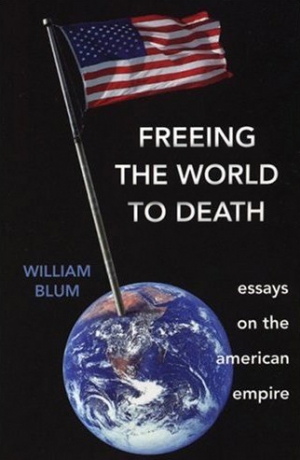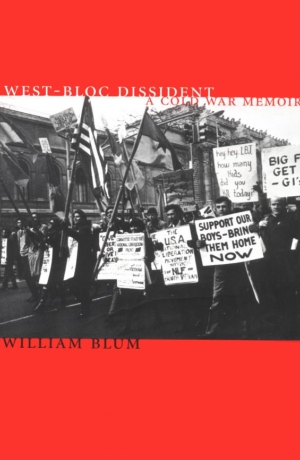The Anti-Empire Report #87
By William Blum – Published November 2nd, 2010
Jon Stewart and the left
The left in America is desperate; desperate for someone who can inspire them, if not lead them to a better world; or at least make them laugh. TV star Jon Stewart is sometimes funny, especially when he doesn’t try too hard to be funny, which is not often enough. But as a political leader, or simply political educator for the left, forget it. He’s not even what I would call a genuine, committed leftist. What does he have to teach the left? He himself would certainly not want you to entertain the thought that Jon Stewart is in any way a man of the left.
He billed his October 30 rally on the National Mall in Washington, DC, as the Million Moderate March. Would a person with a real desire for important progressive social and political change, i.e, a “leftist”, so ostentatiously brand himself a “moderate”? Even if by “moderate” he refers mainly to tone of voice or choice of words why is that so important? If a politician strongly supports things which you are passionate about, why should it bother you if the politician is vehement in his arguments, even angry? And if the politician is strongly against what you’re passionate about does it make you feel any better about the guy if he never raises his voice or sharply criticizes those on the other side? What kind of cause is that to commit yourself to?
Stewart in fact appears to dislike the left, perhaps strongly. In the leadup to the rally he criticized the left for various things, including calling George W. Bush a “war criminal”. Wow! How immoderate of us. Do I have to list here the 500 war crimes committed by George W. Bush? If I did so, would that make me one of what Stewart calls the “crazies”? In his talk at the rally, Stewart spoke of our “real fears” — “of terrorists, racists, Stalinists, and theocrats”. Stalinists? Where did that come from, Glenn Beck? What decade is Stewart living in? What about capitalists or the corporations? Is there no reason to fear them? Is it Stalinists who are responsible for the collapse of our jobs and homes, our economy? Writer Chris Hedges asserts: “Being nice and moderate will not help. These are corporate forces that are intent on reconfiguring the United States into a system of neofeudalism. These corporate forces will not be halted by funny signs, comics dressed up like Captain America or nice words.”
Stewart also grouped together “Marxists actively subverting our constitution, racists and homophobes”. Welcome to the Jon Stewart Tea Party. In his long interview last week of President Obama on his TV show, Stewart did not mention any of America’s wars. That would have been impolite and divisive; maybe even not nice.
He billed his rally as being “for people who are politically dissatisfied but who are not ideological”. (Democracy Now, November 1, 2010) Really, Jon? You have no ideology? To those who like to tell themselves and others that they don’t have any particular ideology I say this: If you have thoughts about why the world is the way it is, why society is the way it is, why people are the way they are, what a better way would look like, and if your thoughts are fairly well organized, then that’s your ideology, even if it’s not wholly conscious as such. Better to organize those thoughts as best you can, become very conscious of them, and then consciously avoid getting involved with individuals or political movements who have an incompatible ideology. It’s like a very bad marriage.
America’s press corps(e)
“Goyim [non-Jews] were born only to serve us. Without that, they have no place in the world; only to serve the People of Israel,” said Rabbi Ovadia Yosef in a sermon in Israel on October 16. Rabbi Yosef is the former Sephardi Chief Rabbi of Israel and the founder and spiritual leader of the Shas Party, one of the three major components of the current Israeli government. “Why are gentiles needed?” he continued. “They will work, they will plow, they will reap. We will sit like an effendi [master] and eat,” he said to some laughter.
Pretty shocking, right? Apparently not shocking enough for the free and independent American mainstream media. Not one daily newspaper has picked it up. Not one radio or TV station. Neither have the two leading US news agencies, Associated Press and United Press International, which usually pick up anything at all newsworthy. And the words of course did not cross the lips of any American politician or State Department official. Rabbi Yosef’s words were reported in English only by the Jewish Telegraph Agency, a US-based news service (October 18), and then picked up by a few relatively obscure news agencies or progressive websites. We can all imagine the news coverage if someone like Iranian president Mahmoud Ahmadinejad said something like “Jews have no place in the world but to serve Islam”.
On October 8, 2001, the second day of the US bombing of Afghanistan, the transmitters for the Taliban government’s Radio Shari were bombed and shortly after this the US bombed some 20 regional radio sites. US Secretary of Defense Donald Rumsfeld defended the targeting of these facilities, saying: “Naturally, they cannot be considered to be free media outlets. They are mouthpieces of the Taliban and those harboring terrorists.” 1
In 1999, during the US/NATO 78-day bombing of the former Yugoslavia, state-owned Radio Television Serbia (RTS) was targeted because it was broadcasting things which the United States and NATO did not like (like how much horror the bombing was causing). The bombs took the lives of many of the station’s staff, and both legs of one of the survivors, which had to be amputated to free him from the wreckage. 2 UK Prime Minister Tony Blair told reporters that the bombing was “entirely justified” for the station was “part of the apparatus of dictatorship and power of Milosevic”. 3 Threatening more such attacks on Serbian media, Pentagon spokesman Kenneth Bacon declared a few hours after the bombing: “Stay tuned. It is not difficult to track down where TV signals emanate from.” 4
Accordingly, it should not be surprising if some of the leading members of the United States mainstream media — from the New York Times to CNN, from NPR to Fox News — were to fall victim to a bomb, placed by someone who feels that naturally they cannot be considered to be free media outlets, and are part of the apparatus of imperialism and power of the United States.
Anti-communism 101: Hijacking history
We like to think of death as the time for truth. No matter how much the deceased may have lived a lie, when he goes to meet his presumed maker the real, sordid facts of his life will out. Or at least they should; the obituary being the final chance to set the record straight. But obituaries very seldom perform this function, certainly not obituaries of those who played an important role in American foreign policy; the myths surrounding foreign policy and the deceased individual’s role therein accompany him to the grave, and thence into Texas-approved American history textbooks.
In January of this year I commented in this report on the obituary of Lincoln Gordon 5 , former ambassador to Brazil and State Department official. The obituary in the Washington Post painted him, as I put it, as a “boy wonder, intellectual shining light, distinguished leader of men, outstanding American patriot.” No mention whatsoever was made of the leading role played by Gordon in the military overthrow of a progressive Brazilian government in 1964, resulting in a very brutal dictatorship for the next 21 years. Later, Gordon blatantly lied about his role in testimony before Congress.
Now we have the death a few weeks ago of Phillips Talbot, who was appointed by President Kennedy to be Assistant Secretary of State for Near Eastern and South Asian affairs and later became ambassador to Greece. In 1967 the Greek military and intelligence service, both closely tied to the CIA, overthrew another progressive government, that of George Papandreou and his son, cabinet minister Andreas Papandreou. For the next seven years the Greek people suffered utterly grievous suppression and torture. Talbot’s obituary states: “Dr. Talbot was asleep in his bed while tanks rumbled through the streets of Athens and was completely surprised when Armed Forces radio announced at 6:10 a.m. that the military had taken control of the country. Dr. Talbot was adamant that the United States was impartial throughout the transition. ‘You may be assured that there has been no American involvement in or, in fact, prior knowledge of the climactic events that those residing in this country have lived through in the past couple of years,’ Dr. Talbot told the New York Times in 1969 shortly before he returned home.” 6
Andreas Papandreou had been arrested at the time of the coup and held in prison for eight months. Shortly after his release, he and his wife Margaret visited Ambassador Talbot in Athens. Papandreou later related the following:
I asked Talbot whether America could have intervened the night of the coup, to prevent the death of democracy in Greece. He denied that they could have done anything about it. Then Margaret asked a critical question: What if the coup had been a Communist or a Leftist coup? Talbot answered without hesitation. Then, of course, they would have intervened, and they would have crushed the coup. 7
In November 1999, during a visit to Greece, President Bill Clinton was moved to declare:
When the junta took over in 1967 here the United States allowed its interests in prosecuting the cold war to prevail over its interest — I should say its obligation — to support democracy, which was, after all, the cause for which we fought the cold war.(sic) It is important that we acknowledge that. 8
Clinton’s surprising admission prompted the retired Phillips Talbot to write to the New York Times: “With all due respect to President Clinton, he is wrong to imply that the United States supported the Greek coup in 1967. The coup was the product of Greek political rivalries and was contrary to American interests in every respect. … Some Greeks have asserted that the United States could have restored a civilian government. In fact, we had neither the right nor the means to overturn the junta, bad as it was.” 9
Or, as Bart Simpson would put it: “I didn’t do it, no one saw me do it, you can’t prove anything!”
After reading Talbot’s letter in the Times in 1999 I wrote to him at his New York address reminding him of what Andreas Papandreou had reported on this very subject. I received no reply.
The cases of Brazil and Greece were of course just two of many leftist governments overthrown, as well as revolutionary movements suppressed, by the United States during the Cold War on the grounds that America had a moral right and obligation to defeat the evil of Soviet communism that was — we were told — instigating these forces. It was always a myth. Bolshevism and Western liberalism were united in their opposition to popular revolution. Russia was a country with a revolutionary past, not a revolutionary present. Even in Cuba, the Soviets were always a little embarrassed by the Castro-Guevara radical fervor. Stalin would have had such men imprisoned. The Cold War was not actually a struggle between the United States and the Soviet Union. It was a struggle between the United States and the Third World. What there was, was people all over the Third World fighting for economic and political changes against US-supported repressive regimes, or setting up their own progressive governments. These acts of self-determination didn’t coincide with the needs of the American power elite, and so the United States moved to crush those governments and movements even though the Soviet Union was playing virtually no role at all in the scenarios. It is remarkable the number of people who make fun of conspiracy theories but who accept without question the existence of an International Communist Conspiracy. 10
The United States’ annual self-imposed humiliation
For years American political leaders and media were fond of labeling Cuba an “international pariah”. We don’t hear that any more. Perhaps one reason is the annual vote in the United Nations General Assembly on the resolution which reads: “Necessity of ending the economic, commercial and financial embargo imposed by the United States of America against Cuba”. This is how the vote has gone (not including abstentions), this year being the strongest condemnation yet of Washington’s policy:
| Year | Votes (Yes-No) | No Votes |
|---|---|---|
| 1992 | 59-2 | US, Israel |
| 1993 | 88-4 | US, Israel, Albania, Paraguay |
| 1994 | 101-2 | US, Israel |
| 1995 | 117-3 | US, Israel, Uzbekistan |
| 1996 | 138-3 | US, Israel, Uzbekistan |
| 1997 | 143-3 | US, Israel, Uzbekistan |
| 1998 | 157-2 | US, Israel |
| 1999 | 155-2 | US, Israel |
| 2000 | 167-3 | US, Israel, Marshall Islands |
| 2001 | 167-3 | US, Israel, Marshall Islands |
| 2002 | 173-3 | US, Israel, Marshall Islands |
| 2003 | 179-3 | US, Israel, Marshall Islands |
| 2004 | 179-4 | US, Israel, Marshall Islands, Palau |
| 2005 | 182-4 | US, Israel, Marshall Islands, Palau |
| 2006 | 183-4 | US, Israel, Marshall Islands, Palau |
| 2007 | 184-4 | US, Israel, Marshall Islands, Palau |
| 2008 | 185-3 | US, Israel, Palau |
| 2009 | 187-3 | US, Israel, Palau |
| 2010 | 187-2 | US, Israel |
Is the United States foreign policy establishment capable of being embarrassed?
Each fall, however, the UN vote is a welcome reminder that the world has not completely lost its senses and that the American empire does not completely control the opinion of other governments.
How it began: On April 6, 1960, Lester D. Mallory, Deputy Assistant Secretary of State for Inter-American Affairs, wrote in an internal memorandum: “The majority of Cubans support Castro … The only foreseeable means of alienating internal support is through disenchantment and disaffection based on economic dissatisfaction and hardship. … every possible means should be undertaken promptly to weaken the economic life of Cuba.” Mallory proposed “a line of action which … makes the greatest inroads in denying money and supplies to Cuba, to decrease monetary and real wages, to bring about hunger, desperation and overthrow of government.” 11 Later that year, the Eisenhower administration instituted the suffocating embargo against its eternally-declared enemy.
CovertAction Quarterly
From 1978 to 2005 one of the leading progressive print (Remember that word?) magazines in the world, dealing primarily with US foreign policy, the CIA/NSA/FBI, repression at home and abroad, and corporate crime. The magazine, initially called CovertAction Information Bulletin, regularly published the names and career histories around the globe of undercover CIA officers derived from careful research of open, public sources. This so infuriated the powers-that-be that Congress passed the Intelligence Identities Protection Act in 1982, which made the practice of revealing the name of an undercover officer illegal under US law. The law was a virtual bill of attainder — it is unconstitutional for Congress to enact legislation directed at a specific individual or organization. At the time, members of the House Intelligence Committee were telling journalists and lawyers that the legislation was aimed only at CovertAction Information Bulletin and its editors, but this was always said off the record and no one would confirm it on the record; although during the House debate Congressman William Young (R.-FL) declared: “What we’re after today are the Philip Agees of the world.” 12 Ironically, the law became the basis for the prosecution of George W. Bush special counsel Lewis ‘Scooter’ Libby, who outed CIA employee Valerie Plame.
Amongst the magazine’s numerous contributors were Philip Agee, John Stockwell, Ralph McGehee, Ellen Ray, William Schaap, Louis Wolf, Michael Parenti, Noam Chomsky, Mumia Abu-Jamal, Leonard Peltier, Diana Johnstone, Sean Gervasi, Philip Wheaton, Immanuel Wallerstein, Kathy Kelly, Tony Benn, Ramsey Clark, David MacMichael, Edward Herman, William Blum (Whatever happened to him?), Michel Chossudovsky, Marjorie Cohn, James Petras, Gregory Elich, and many other prominent progressive writers.
A recent Washington Post story states: “The private papers of Philip Agee, the disaffected CIA operative whose unauthorized publication of agency secrets 35 years ago was arguably far more damaging than anything WikiLeaks has produced, have been obtained by New York University, which plans to make them public next spring.” 13
A partial Table of Contents for each of the issues can be found here.
Individual copies or the entire set of 78 issues (mostly original copies and about a dozen in quality photocopy format) are available for purchase: $3.00 per issue, 25 copies for $65.00, 50 for $115, or all 78 for $165, including postage in the United States. To place an order, write:
Louis Wolf
1500 Massachusetts Avenue NW, Room 732
Washington, DC 20005
… or e-mail louw7@live.com
Notes
- Index on Censorship, the UK’s leading organization promoting freedom of expression, October 18, 2001
- The Independent (London), April 24, 1999, p.1
- Bristol (UK) Evening Post, April 24, 1999
- The Guardian (London), April 24, 1999
- Anti-Empire Report, January 2010
- Washington Post, October 7, 2010
- Andreas Papandreou, Democracy at Gunpoint: The Greek Front (1970), p.294
- New York Times, November 21, 1999
- New York Times, November 23, 1999
- See William Blum, Killing Hope: US Military and CIA Interventions Since World War II for details of the Cold War
- Department of State, Foreign Relations of the United States, 1958-1960, Volume VI, Cuba (1991), p.885
- Wikipedia: Intelligence Identities Protection Act
- Washington Post online, October 26, 2010, “Spytalk” by Jeff Stein
Any part of this report may be disseminated without permission, provided attribution to William Blum as author and a link to williamblum.org is provided.
